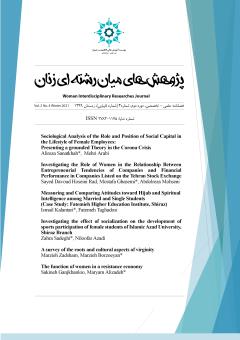The function of women in a resistance economy
Subject Areas : Other related topicssakineh ganjkhanloo 1 , Maryam Alizade 2 *
1 - Level 3 student, Department of Interpretation of Quranic Sciences, Zeinabieh Seminary, Alborz Province, Alborz, Iran
2 - PhD in Islamic Education and Lecturer, Department of Quran and Islamic Texts, Faculty of Islamic Education, University of Tehran, Tehran, Iran.
Keywords: Resistance Economy, Women, Family, Culture Building, Economic Growth,
Abstract :
The function of women in the resistance economy is one of the important and influential reasons in society, family, and particularly in the society's economy. Paying attention to the principles governing female personality, the origin, and source of the distinction between function in male and female resistance economics also cause biological, behavioral, economic, and legislative differences. In religious thought, although employment is considered a right for women, it is never imposed on them as an economic obligation. Creating attitudes of resistance economy can pave the way for a healthy and refreshing family and society, away from harm. In this article, documentary methods are used to deal with the consequence of economic actions in Islamic lifestyle researchers, achieving a resistant economy and transformation in the family. Which first defines women, family, society, and resistance economy, and then the undeniable effects of women, both positively and negatively, are considered. Finally, according to the findings, it attempts to realize the trend of changes in the future based on the emphasis on the resistance economy.
1- آذری موفق، م. (1385). نقش زنان در فرهنگ¬سازی اقتصاد مقاومتی. مجله نامه فرهنگ و ارتباطات، 4(1)، 26-41.
2- برقی، ح.، قنبری، ی.، حجاریان، ا.، و محمدی، م. (1390). بررسی توزیع فضایی فعالیت¬های پایه¬ای اشتغال زنان در بخش¬های اقتصادی کشور. فصلنامه مطالعات اجتماعی-روا¬نشناختی زنان، 9(3)، 193-167.
3- بهرامی، ن. (۱۳۹۹). بررسی نقش زنان درتحقق مؤلفه¬های اقتصادمقاومتی. فصلنامه تحلیل خبری سازمان بسیج جامعه زنان
4- بیدی، ح.، و بیدی، ز. (1395). جایگاه زن در اقتصاد مقاومتی. دومین کنفرانس جامع و بین¬المللی اقتصاد مقاومتی.
5- خزعلی، ک.، و آیت¬اللهی، ز. بررسی نقش و ابعاد تأثیرگذاری زنان در اقتصاد مقاومتی. شورای عالی انقلاب فرهنگی. بازیابی-شده در 20 اردیبهشت 1399 از بررسی نقش و ابعاد تأثیرگذاری زنان در اقتصاد مقاومتی https://sccr.ir.News/11178/1/
6- رجاییان، م.، و باقرپور، پ. (1394). بررسی دلایل موثر بر نرخ همکاری اقتصادی زنان با رویکرد پویایی¬شناسی سیستم. فصلنامه مطالعات اجتماعی-روانشناختی زنان، 13(2)، 36-7.
7- زندی، ف.، دامن¬کشیده، م.، و مرادحاصل، ن. (1391). نقش و جایگاه رشد اقتصادی بر همکاری زنان در کشورهای منتخب آسیا. فصلنامه علمی-پژوهشی زن و فرهنگ، 3(11)، 125-111.
8- علمی، ز.، و روستائی شلمانی، خ. (1393). اثر پیشرفت بر همکاری اقتصادی زنان کشورهای منا با استفاده از شیوه پانل پروبیت کسری. پژوهشهای رشد و پیشرفت اقتصادی، 4(14)، 28-11.
9- کریمی¬موقاری، ز.، نظیفی نایینی، م.، و عباسپور، س. (1392). دلایل اقتصادی موثر بر اشتغال زنان در ایران. فصلنامه مطالعات اجتماعی-روان¬شناختی زنان، 11(3)، 53-80.
10- نظامی¬وند چگینی، ز.، و سرایی، ح. (1392). دلایل موثر بر همکاری زنان شهر تهران در نیروی کار. مجله برنامه¬ریزی رفاه و پیشرفت اجتماعی، 15، 45-1.
11- نوفرستی، م. (۱۳۹۱). ریشه واحد و همجمعی در اقتصاد سنجی. تهران: انتشارات درسا.
12- واعظ¬زاده، ر. (1395). بررسی نقش زنان در اقتصاد مقاومتی. کنفرانس بین¬المللی و آنلاین اقتصاد سبز.

